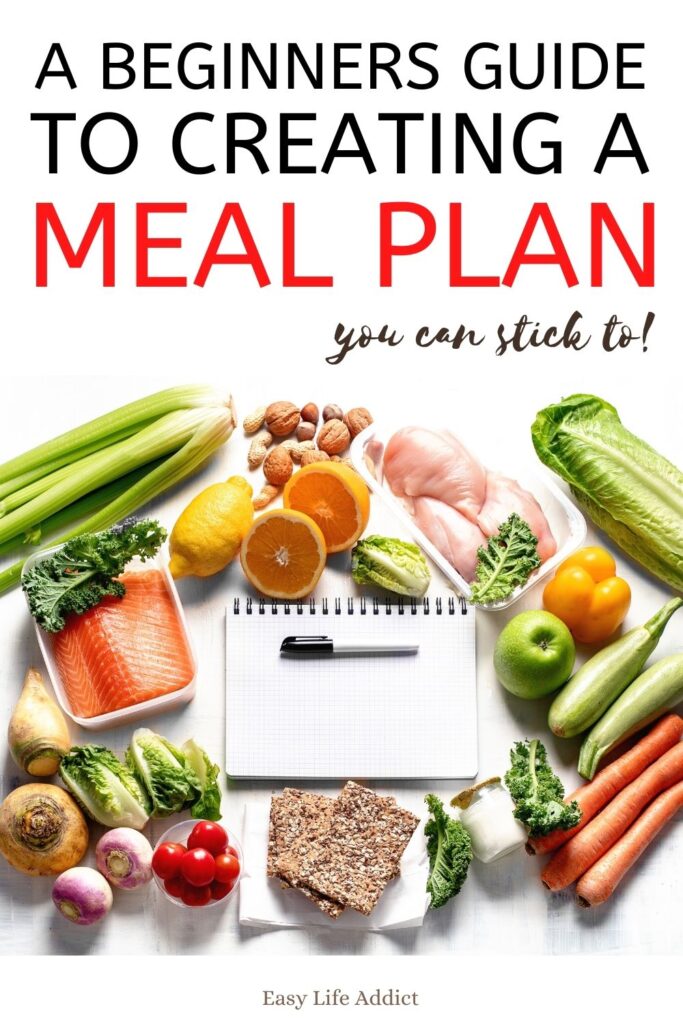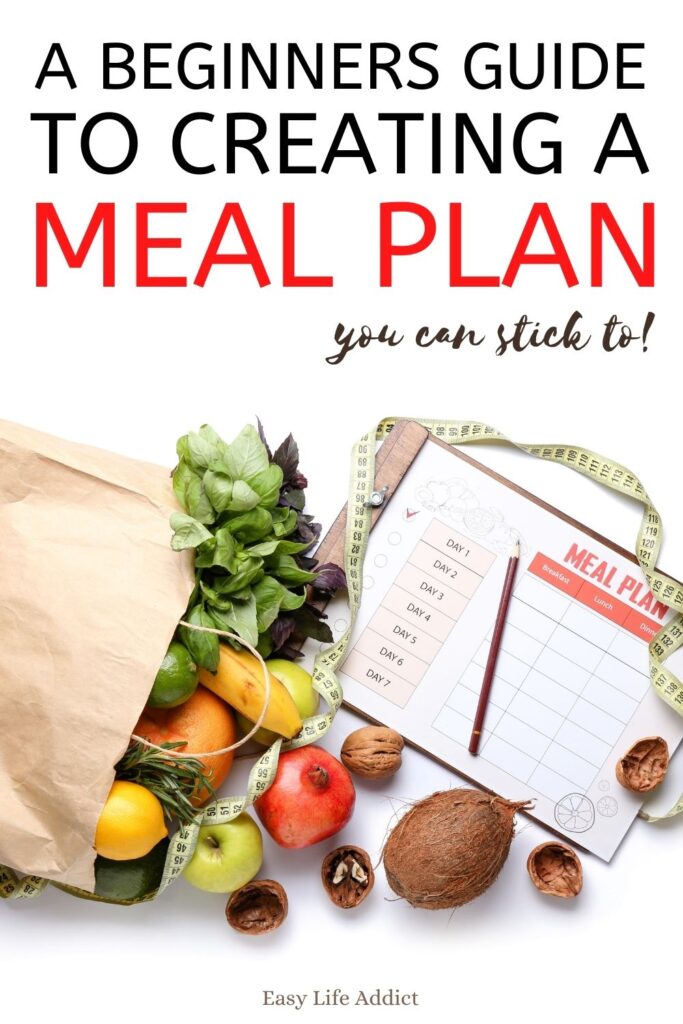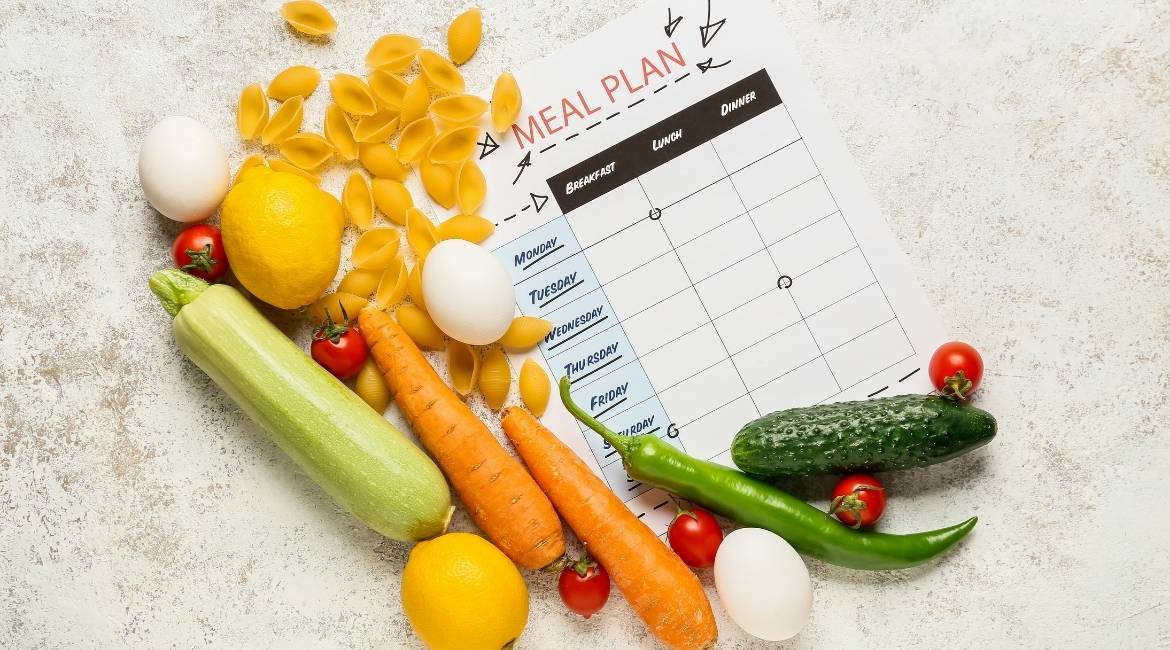Create a Meal Plan That the Whole Family will Love!
Are you trying to get more organised in the kitchen? Are you trying to eat healthier or want to reduce waste and save money? If so, meal planning could be for you.
Meal planning may sound complicated, but it isn’t. The most important thing is to take the time to plan properly so that you have a meal plan that you can stick to and that your family will enjoy eating. If you have never planned your meals ahead of time, this easy 8-step guide on how to create a meal plan is for you.
This post may contain affiliate links. That means that if you click on a link and purchase something I recommend, I will receive a small commission at no extra cost to you. As an Amazon Associate, I earn from qualifying purchases. This helps keep my website up and running and is very appreciated. Thank you for your support! You can read my full disclosure policy here.
What is meal Planning?

Meal planning is the process of preparing a menu for a week or more in advance. It can help you save money by allowing you to purchase only the necessary ingredients and reducing food waste. Meal planning can also be beneficial if you have special dietary needs or are trying to achieve health and fitness goals. Regardless of your reasons for meal planning, it can save you time and money, reduce food waste, and help you achieve your dietary objectives.
Read more: 20 Ways to save money on your grocery bill.
Why Meal Plan?
As mentioned, meal planning can reduce waste and help you stick to your health and fitness goals. Here’s how:
Saving money – The number of times I’ve gone food shopping and bought all kinds of food I think I will eat. The fridge ends up full to the brim only to be full of food that has gone off or past its use-by date a week or so later. The amount of food wasted this way is astounding. A study in the UK revealed that the average UK household wasted £355.68 worth of food every year!
By creating a meal plan, you can make a shopping list that ensures you only buy what you are likely to eat, saving you money and reducing waste.
Saving time – We have all been in this all-too-common situation: getting home after a stressful day at work and having to decide what to cook for dinner. You check the cupboards and the freezer, and you just can’t decide, or you think of something and then realise you are missing some ingredients. How frustrated do you feel?
By planning meals in advance, you can just get home and already know what to cook, saving you time and energy trying to sort something out.
Save your sanity – Figuring out what to cook each night can become extremely stressful. This is especially true if you have a large family or picky eaters to keep satisfied.
Instead, you can discuss with all your family members and create a meal plan together. This way, you won’t be met with everyone wanting something different and having to negotiate what to cook.
Keeps you accountable – If you are trying to lose weight and get fitter or healthier, sticking to a meal plan can help you reach your goals.
Making a meal plan that you will enjoy and that is in line with your health goals is important. This way, you are more likely to stick to it and won’t be tempted by unhealthy snacks or your favourite fast food outlet.
How to Create a Meal Plan:

So you want to try meal planning but don’t know where to start?
A successful meal plan isn’t just plucking random meals onto paper. You have to put in a little effort in the beginning for it to work.
Here are my ten simple steps to create a great meal plan that the whole family will enjoy. If done properly, you will wonder how you ever coped without one!
1. Plan Ahead
When creating a meal plan, the first step is to plan ahead. This way, you can create a meal plan that the whole family can enjoy. You might also start to enjoy the process.
2. Check Calendar
Do you have any special events coming up? Do the kids have any after-school activities? By organising your meal plan around your calendar, you can add extra portions, ensure busy days have easy prep meals or skip a few meals if necessary.
For days when you need some quick meals, why don’t you cook in advance and freeze until needed? Soups, curries, and pasta dishes are all easy meals that can be popped in the freezer. One-pot or slow cooker recipes are also great ideas for when you are short on time.
3. Dietary Requirements
Does anyone in the family have any special dietary requirements? Is there a way to incorporate these requirements into the meal plan without cooking separate meals?
4. Budget
Do you need to stick to a budget? If so, break down your budget into weekly amounts and try and stick to it. For example, if your monthly grocery budget is £400, stick to less than £100 a week. As you get better at creating meal plans, you will probably be spending less on groceries as the weeks go by.
Read more: How to create a budget, a beginners guide
Tip – When shopping, look out for sales and offers. Try to stock up on regular-use dry foodstuffs like pasta, rice and tinned products. Also, look for fresh meat on offer that can be frozen for future use.
5. Check Stocks
Before making a meal plan, check what you already have in your cupboards. Try to use these items before they go off or spoil. This will also prevent you from buying items you already have on your shelves.
6. Research Recipes
There are all sorts of ways that you can research recipes these days. You can check your favourite cookbooks, the internet or even social media.
When picking out meals, choose those incorporating items you already have at home and what you know the family will enjoy. Try not to pick out anything too elaborate; instead, select meals that are tasty and easy to make.
You could, however, plan a few special meals for certain days of the week. How about a themed or fakeaway night, cooking your favourite takeaway meals from scratch at home?
Here are a few more tips on creating a perfect meal plan:
Choose meals that provide leftovers – If you plan on cooking a piece of beef on Sunday, use the leftovers for a curry on Monday. Likewise, if you cook a rice dish, cook more and use the leftovers for lunch the following day.
Cook what you know – When starting, choose meals that you already know and love. You can start incorporating more complex recipes as you get used to creating meal plans.
Use common ingredients – Use common ingredients and seasonal produce. These items are usually more abundant and, therefore, better value for money.
Read more: 70 Meal prep and batch cooking recipes
7. Make a List
Once you have your meal plan, write down a shopping list. This way, you will only buy what you need, reduce waste, and save money. Try to organise your list by aisle or store; that way, you will save time as well.
If you are one for normally adding all those great-looking offers to your cart, then why not shop online instead? Most UK-based retailers offer online shopping with free delivery if you spend over a certain amount. This way, you will only buy what you need.
8. Stick to it
You have your meal plan, and you’ve been shopping. All that’s left is to stick to the plan!
Keep going even if you struggle to stick to a meal plan. Think about why your current meal plan is hard to maintain. Is there something you could change next time around?
Changing a few meals now and again is not the end of the world. It’s whatever works best for you and your family.

Download Portrait meal plan for free here

Download Landscape meal plan for free here
Final Thoughts
Meal planning is a great way to save money, stick to a specialised diet, and achieve fitness goals. But it also has another benefit: it can help reduce food wastage. By planning your meals in advance, you’re less likely to purchase items you won’t use or end up throwing away. So why not give meal planning a try? You may be surprised at how much of a difference it makes!
Remember to check out our related resources for more great food tips and recipe ideas.
Thanks so much for stopping by; I appreciate everyone who takes the time to read and make it to the end! I have lots of exciting new content in the next few weeks, so make sure you pop back to catch up!









